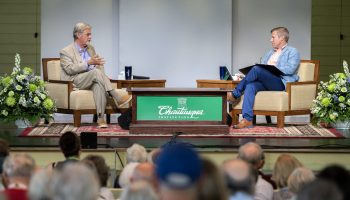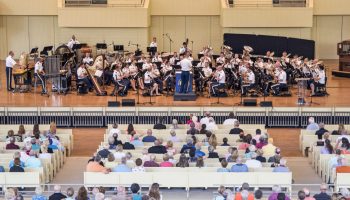“We know the gospel for the Prodigal. What is the gospel for the Elder Brother? Both wanted to be welcomed into the arms of the Father and both wanted a celebration,” said the Rev. M. Craig Barnes at the 9:15 a.m. Monday morning worship service in the Amphitheater.
“The Prodigal got there by mercy. How do good people get there?” Barnes asked.
Barnes’ sermon title was “The Gospel for the Anxious,” the second in his series on “Saving the Elder Brother.” The Scripture reading was Luke 15:25-29.
In Luke 15, the Elder Brother objected to the grace the Father had shown the Prodigal. The Elder Brother told the Father, “I worked like a slave for you and you never even gave me a goat, much less a fatted calf.”
Barnes said the struggle for the Prodigal was regret and guilt, while the Elder Brother struggled with anxiety.
“The Elder Brother worked hard to build something that he didn’t know would work,” Barnes said.
No one goes to a job interview to become a slave, Barnes said. People look for dream jobs where they think they can make a difference for the company or the world, and “it is not long before the dream job turns into a nightmare, and as hard as you may be working, it feels like you are working like a slave.”
Elder Brothers are people who believe in the “gospel of hard work.” They are people who make things happen, who can be counted on to get things done. They believe that God helps those who help themselves but, Barnes said, “that is not in the Bible. It is in the ‘Elder Brother handbook.’ ”
Elder Brothers also believe that they should be rewarded for their work.
“They believe that ‘no one gives it to you when you work hard. You get what you deserve,’ ” Barnes said. “Grace is a scandal to those who want what they think they deserve.”
When Barnes was a pastor, he thought: “Oh no, trust me, you don’t want what you deserve. All Elder Brothers feel that work should be fulfilling, that there should be parties for them, but it is the Prodigal who gets the party. Prodigals get fulfillment when they didn’t earn it.”
In modern times, work is freighted with higher expectations than any time in history, Barnes said. Historically, it was primarily a means of providing for yourself and your family.
His grandfather was a sixth-generation tobacco farmer, and when Barnes was trying to decide what he would do for fulfilling work, he asked his grandmother if his grandfather had been fulfilled.
Barnes had to explain the concept of fulfilling work to his grandmother, and her response was, “He was a farmer.”
“It never occurred to him to ask if he was fulfilled,” Barnes said. “He inherited an identity and a mission.”
In today’s world, young people leave home to find themselves. Their identity is considered an achievement of self construction, and parents and young people are told not to let your home define who you are.
“When your child gets to college, the counselors tell the parents that it is your child’s choice and you get to pay for it,” Barnes said.
Choice is all consuming. Parenting advisers tell parents to help their child make good choices.
“Little Johnny throws a rock through a window,” Barnes said, “and instead of going out and reprimanding him or spanking him, as a parent you are supposed to bring him inside and point to the broken window and the rock and ask, ‘Was that a good choice?’ If Johnny is smart he will say ‘no.’ ”
Choice continues throughout life. At age 18, college students are choosing a major and they think they are choosing a life, he said.
“There are good TV shows about doctors, so the student picks pre-med on the registrar’s website and then goes to Biology 101 and realizes she will not be a doctor,” Barnes said.
Then the student realizes that there are good TV shows about lawyers and so becomes pre-law.
“In 15 minutes, she has just changed the trajectory of her life,” Barnes said. “And when she graduates, she has to choose a life and a job that she expects will be a ticket to fulfillment.”
The problem, Barnes said, is that we all come with limitations. People continue to act like life is the college registrar’s office — trying to pick a city, a church, friends that will bring fulfillment and when they don’t bring that fulfillment, they choose again.
“They have bought into the illusion that they can try to pick a life they like, that they should be fulfilled by work — whether that is law, medicine, raising children or volunteering,” Barnes said.
Maybe you know this anxiety, he said.
“You look at the clock and it is 2:01, then 2:02, then 2:03,” he said. “When I am wracked by anxiety, I try to argue my way out of it, and that never works. You can’t argue yourself out of fear because fear is not rational; anxiety has no target.”
The only thing that works is to be loved out of anxiety.
“When your child wakes up screaming in the middle of the night, you don’t talk with him rationally, telling him there are no monsters,” Barnes said. “No, you rush in and tell him he is loved, and you hold him and he forgets about the monsters.”
Barnes reads the Psalms or the Gospels when he can’t sleep.
“I renew myself in the love that God has for me,” he said.
The Elder Brother has to give up thinking he is deserving of love because no one deserves love.
“Love is always a gift, a commitment, a decision,” Barnes said.
God gives love that can only be received, and that is a challenge for those who strive to be rewarded for their achievements.
Barnes said that in his congregations, he used to close the worship service by letting the worshippers know that they could decide how to spend their week. They could choose to achieve life, in which case “complaint would be their constant companion because they could never achieve life.”
However, if they received life as grace from God, they would experience gratitude.
“There are so many blessings that have already been accomplished this morning by the grace of God,” Barnes said.
Achievement leads to anxiety, and grace leads to gratitude, Barnes said.
“To choose gratitude is a wonderful way to live,” he concluded.
The Rev. Robert M. Franklin Jr. presided. The Rev. Robert Hagel, pastor of First Presbyterian of Jamestown, read the Scripture. He came to Jamestown in 2014 and he and his wife, Kate, have seven children. After graduating from Louisville Presbyterian Seminary, he spent a year as a young adult volunteer through the Presbyterian Church (USA) in Northern Ireland to do ministry and play soccer. The Motet Choir, under the direction of Jared Jacobsen, organist and coordinator of worship and sacred music, sang “Lord, For Thy Tender Mercy’s Sake,” by Richard Farrant, for the anthem. The Gladys R. Brasted and Adair Brasted Gould Memorial Chaplaincy provides support for this week’s services.




